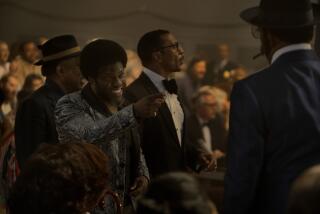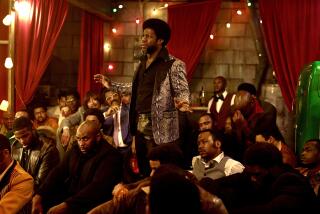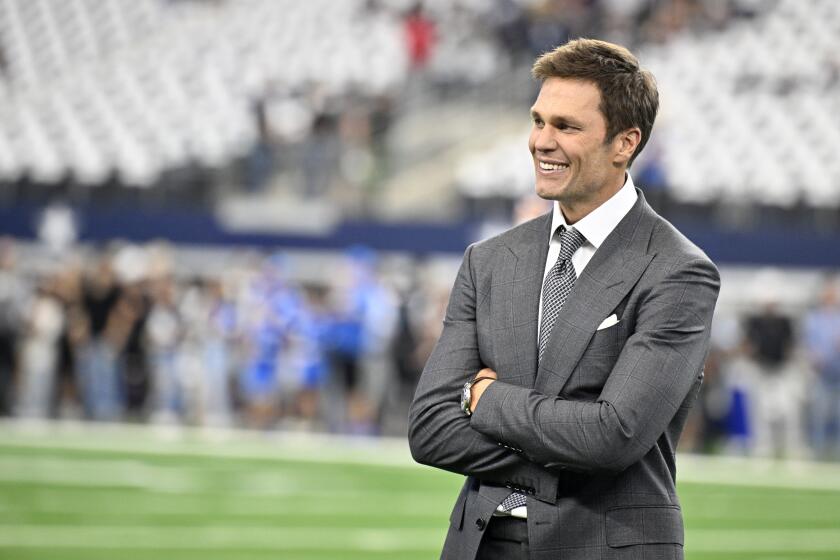From Clay to Ali: Extreme to Mainstream
BROOKLYN, N.Y. — ‘I like the Muslims,” he told one reporter, adding defiantly, “I’m not going to get killed trying to force myself on people who don’t want me. I like my life. Integration is wrong.”
So said one of the most beloved men of the past century, when he was full of voice and fury and chiseled smooth by majestic power. Such statements could have been a roar given the vintage: a full-force black man blasting forth like a shot out of nature to scatter fear and controversy across a shocked nation. He was no light threat.
That king of the canvas, now an afflicted giant and global icon, was Cassius Clay in 1963, just months before embracing the moniker that now lights--and often moistens--our eyes, Muhammad Ali.
Perhaps President Richard M. Nixon’s character is being posthumously transformed. Certainly, in an age hell-bent on disclosure yet loyal to redemption, many think Pete Rose is due. But Ali’s embrace of the Nation of Islam then, like his unapologetic denunciation of integration, would not fare so well with the public even today. The question is not whether our acceptance requires repudiation by the famous, but why transformation occurs for some figures and not others.
That Ali was a heavyweight champion may be only symbolic of his fame, not its essence. Like “bad Negro” fighters, such as Jack Johnson, and “good Negro” fighters, such as Joe Louis, generations before him, Ali’s physical prowess represented the rage of the dispossessed across America and the world, the sheer sight of his sculpted brawn, flexed and poised for ever-ready pummeling against long odds. Like his onetime friend Malcolm X, whose own legacy has been resurrected recently across racial lines, Ali epitomized the poetic mouth of resistance to white supremacy here and abroad, for which he paid dearly.
But unlike Malcolm, Ali has survived. With humbled boxing skills but without repudiating his beliefs, he has lived into the stages of life that disarm youth’s fearsome imagery. There are others we loved and feared whom we never saw reflecting on life without their force behind them. Bruce Lee’s indomitable quickness and unyielding progressive principles ended tragically before his views could stand beyond the lethal shadow of roundhouse kicks. At his death, Roberto Clemente’s mastery of baseball’s fundamentals still eclipsed the warrior philanthropist we were just starting to learn about.
All these 20th-century men (and the categories remain so anachronistically masculine), whose bodies conjure heroism and hope, struggled along paths of poverty until they reached our consciousness, only then to traverse their sexuality, size, inexperience and racial heritage before judgment--Good/Bad: Negro/Asian/Latin--by masses that could not possibly have known them at all. Beyond being the repositories of our needs, they somehow managed defiance, marketability, integrity, privacy and, oh, yeah, ass-kicking with regularity.
There are others whose legacies, if not their lives, we accept unequivocally. We honor Jackie Robinson with a distant saintliness. Surprised to still see him slugging away, we thank George Foreman for balding with a waistline and happily eat from his burger maker. We may forever deify Michael Jordan beyond any lasting recognition of his complicated human frailties or bothering with racial differentiation. Jordan is good business. He is business goods. He is whatever I’m going to be when I, too, become an IPO.
But that’s all iconography of a different sort than Ali, who was with us amid screaming hatreds and war-shattered lives, speaking loudly from the chaos and living on. Ali lost. He dutifully lost prime years in the ring because he discovered, earlier than most, that he “ain’t got no quarrel with them Vietcong.” He lost his championship crowns to age and better, angrier opponents. And, more than his affliction with Parkinson’s disease itself, Ali lost that voice.
Maybe the only thing more endearing than a simple silence is a silenced rage. It creates open gaps into which we project words we would rather hear, seems to listen patiently to our thoughtful replies and never interrupts. Although grudges may occupy long pauses, there’s nothing sweeter than the quiet of reconciliation. And that often takes time.
This is not to suggest that the mutual love between Ali and ourselves is not genuine. But many who now see themselves in his slowed gait and stolid face once detested the Greatest of All Time for the mouth on him and the fists to back it up. What was once terrifying for many whites and sanctifying for many blacks is now ancient water under a millennial bridge to each other.
Go to Ali’s Louisville, Ky., however, and wait for the high-tech boom to reach many black neighborhoods. Go to parts of the Bronx, where Clemente’s Puerto Rican kinfolk still wait amid post-industrial ruins. Go to Chinatowns across America and see what the boom has brought. And from below the bridge you will hear screams.
The problem is not our love of the men, but our dedication to their voices when they were still loud kings of righteous anger. There is, after all, a lot still to be angry about. Athletes with the courage to step into the fray beyond their sports were not always right. When the football great Reggie White thought the nation needed a rambling diatribe against homosexuality, he learned (we hope) that his fame did not qualify him.
But most of the extra-sports focus on professional athletes at century’s turn is on their criminality, a rage of a different sort. Though they should be held responsible for their misconduct, we put them there. Very few, if any, professional athletes from segregated communities like the one Ali came from refer to that deprivation or the unfairness of such hardship--not if they expect to keep a shoe contract. We act as though the world has changed so dramatically for those who score and whup and dunk, but, quietly for them, it hasn’t. We briefly hear their sorry voices at arraignments, when they’re pleading before a judge. Otherwise their silence outside sports interviews is golden.
So, why do some icons transform in public consciousness while other figures cannot? It could not be as sound-bitten as good fame or bad; Ali helped to transcend that simplistic distinction--or at least expose it. Jesse Jackson was considered an anti-Semite once, until he disclosed “God is not finished with me yet.” Al Sharpton was a hatemonger to some, until he garnered substantial white votes in statewide elections. Time may not be a curse after all. The trick, it seems, is survival. And so we wait. *
More to Read
Go beyond the scoreboard
Get the latest on L.A.'s teams in the daily Sports Report newsletter.
You may occasionally receive promotional content from the Los Angeles Times.










